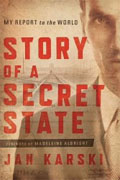Story of a Secret State
Jan Karski
book reviews:
· general fiction
· chick lit/romance
· sci-fi/fantasy
· graphic novels
· nonfiction
· audio books
· author interviews
· children's books @
curledupkids.com
· DVD reviews @
curledupdvd.com
newsletter
win books
buy online
links
home
for authors
& publishers
for reviewers

 |
Story of a Secret State: My Report to the World Jan Karski Georgetown University Press Hardcover 464 pages March 2013 |
|
Jan Karski was a debonair young Polish diplomat in training when, in 1935, he was called to go to war for his homeland. After serving in its military, Jan willingly joined the Polish Resistance directed from England, becoming part of a mysterious, imperiled cadre of nameless operatives engaged in a deadly serious effort to thwart the Nazis and save Poland. So highly valued was his information gathering that it was he who in 1942 was charged with taking to London, and then the United States, the truth about the Nazi genocide of millions of Jews.
Still, what makes the book so remarkable is the freshness and extent of the author’s recollections (he was noted for his photographic memory) and the very human portrayals he presents of his people, almost exhausted but still fighting on against intolerable conditions and apparently insuperable odds. He did not dramatize, only accurately reported, yet his writing evokes the talent, charm, and prodigious intellect of its author in every line, making it as readable today as it was when it was composed. Modestly Karski recounted his own capture by the Nazis, the savage beatings, and his desperate plea for a cyanide capsule when a member of the resistance visited him disguised as a nun. After a remarkably choreographed release, he learned that his rescuers had been told to do everything they could to save him, but if anything went wrong, they would have shot him. It was the dichotomy he lived with afterwards as a trusted member of the resistance, a grey lonely spy-versus-spy world he describes as “humdrum, secretive, dangerous”--where any false move could result in death from either side. It was a “secret state” that operated by its own highly detailed rules, under the noses of its enemies, an organization that Karski would later say was based not on limited goals but on “the moral principles without which nations could not live together.” Karski took time to praise many of his co-workers, with a special chapter for the courageous women who worked tirelessly and facelessly, both in the resistance and in their shattered private lives. His descriptions of the Warsaw ghetto, the last holdout against the Nazis, show a people barely clinging to shreds of human existence even as they were forced to strip and stack the bodies of the dead on the streets, and flee in terror when Hitler Youth, “with their round, rosy-cheeked faces and their blue eyes,” used live people for random target practice. After the visit to Warsaw, Karski went in disguise to a site where Polish Jews were transited to death camps and killed daily, by the thousands. He recounts watching as people were crammed into train cars doused with quicklime: “The entire camp had reverberated with a tremendous volume of sound in which the hideous groans and screams mingled weirdly with shots, curses, and bellowed commands.”Karski stated that “the images of what I saw…are, I am afraid, my permanent possessions,” and they will doubtless stay with anyone who reads his harrowing account. Karski made it successfully to England, where he conferred with Anthony Eden, and to the US, where he had meetings with President Franklin Roosevelt. He subsequently earned a PhD at Georgetown University and taught at the School of Foreign Service. He died in 2000. Yad Vashem honored him with the title Righteous Among the Nations, and he was given a posthumous Presidential Medal of Freedom by President Barack Obama. To the end of his life, Karski, a devout Catholic, held fast to his conviction that the outside world had been deaf to his clear reports of the Holocaust and had abandoned the Jews to Nazi genocide. Originally published on Curled Up With A Good Book at www.curledup.com. © Barbara Bamberger Scott, 2013 |
|
|
|
 Click here to learn more about this month's sponsor! |
|
| fiction · sf/f · comic books · nonfiction · audio newsletter · free book contest · buy books online review index · links · · authors & publishers reviewers |
|
| site by ELBO Computing Resources, Inc. | |
